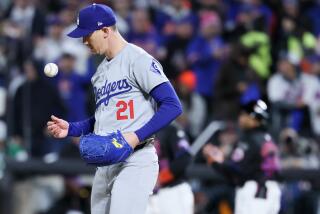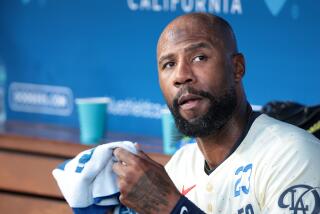Rangers Defy Ueberroth by Calling Up Howe
- Share via
The Texas Rangers called up former Dodger relief pitcher Steve Howe Thursday, in apparent defiance of Commissioner Peter Ueberroth’s desires.
Said Howe, whose career has been marred by drug problems: “I’m ready to drop the controversy. I’m ready to play baseball.”
Wishful thinking?
Only time will prove whether Howe can escape the controversy.
Ueberroth, according to reliable information, is believed to have doubts, which he expressed to Ranger President Mike Stone and General Manager Tom Grieve during a meeting in his New York office Wednesday.
Rich Levin, a spokesman for the commissioner, said Ueberroth would have no comment Thursday on the Rangers’ decision.
It was learned, however, that Ueberroth was angered by the decision, since he had flatly asked the Rangers not to recall Howe, and it ignored his general policy that players with multiple drug offenses spend 60 to 90 days in the minors, proving their ability to stay off drugs through testing, treatment and counseling.
“Every club is familiar with the policy,” one source said. “But the Rangers see themselves in a pennant race and chose to ignore it.”
Can the commissioner take action against the Rangers?
Only to the extent of ordering Howe to continue his testing, the source said.
The Rangers signed Howe July 12 and recalled him from their Oklahoma City farm club Thursday morning, meaning that he had spent 24 days in the minors after returning from half a season with Tabasco of the Mexican League.
Howe said he has been tested 15 times since the Rangers signed him and 200 times since he was suspended by the National Assn. of Professional Clubs, which governs the minor leagues. Howe was suspended after testing positive while with the San Jose Bees last year. The results of that positive test were disputed by Howe.
The association reinstated Howe when he was signed by the Rangers, who did not need Ueberroth’s approval to bring him up.
Neither Grieve nor Stone would discuss their meeting with Ueberroth, although Stone implied that Ueberroth definitely opposed Howe’s recall.
“There is an obvious disagreement between the Rangers and the commissioner’s office regarding Steve Howe,” Stone said. “I don’t want to get into it, but it doesn’t take a rocket scientist to figure what it is.
“We think this is an appropriate time to bring him up. Obviously, (Ueberroth) disagrees.”
No big deal, suggested club owner Eddie Chiles.
“I don’t think Peter Ueberroth has authority to do anything with Steve Howe,” Chiles said. “We didn’t ask for Peter Ueberroth’s endorsement. This was a business decision. We feel that, legally and ethically, it was a sound decision. We don’t know what Peter Ueberroth thinks.”
Don’t know or don’t care?
Said Grieve: “All of us feel that it’s not for us to speculate on whether what we’re doing will anger the commissioner. Steve Howe has done everything and more, on and off the field, to prove he’s a good baseball player and a first-class citizen.”
Howe, 29, was 2-2 with a 3.48 earned-run average at Oklahoma City and did not allow a run in the 7 innings of his last three appearances.
He was the National League’s Rookie of the Year with the Dodgers in 1980, but his involvement with cocaine led to a series of suspensions, and he was ultimately fined $54,000 by then-Commissioner Bowie Kuhn in 1983 and banned from baseball until 1985.
He was re-signed by the Dodgers in October 1984, pitched briefly in the Dominican Republic, had elbow surgery in January 1985 and was 1-0 with three saves when he was released by the Dodgers on July 3 of that year.
He had asked to be released, citing the pressure of trying to resurrect his career in Los Angeles, where his drug problems had developed and festered. He was signed by the Minnesota Twins that August, entered a treatment center after testing positive in September and agreed to his release.
Now, in returning to the majors with the Rangers, Howe said that the pressure and controversy are behind him.
“This is going to be a relief,” he said. “It’s tough going in front of 50,000 people day in and day out, worrying about yourself and your family, let alone the next loaded question from the media, worrying about the next roadblock, what’s going to happen, if you’re going to play or not.
“It will be a relief just to go out and play baseball. I call that a rest.”
More to Read
Go beyond the scoreboard
Get the latest on L.A.'s teams in the daily Sports Report newsletter.
You may occasionally receive promotional content from the Los Angeles Times.










